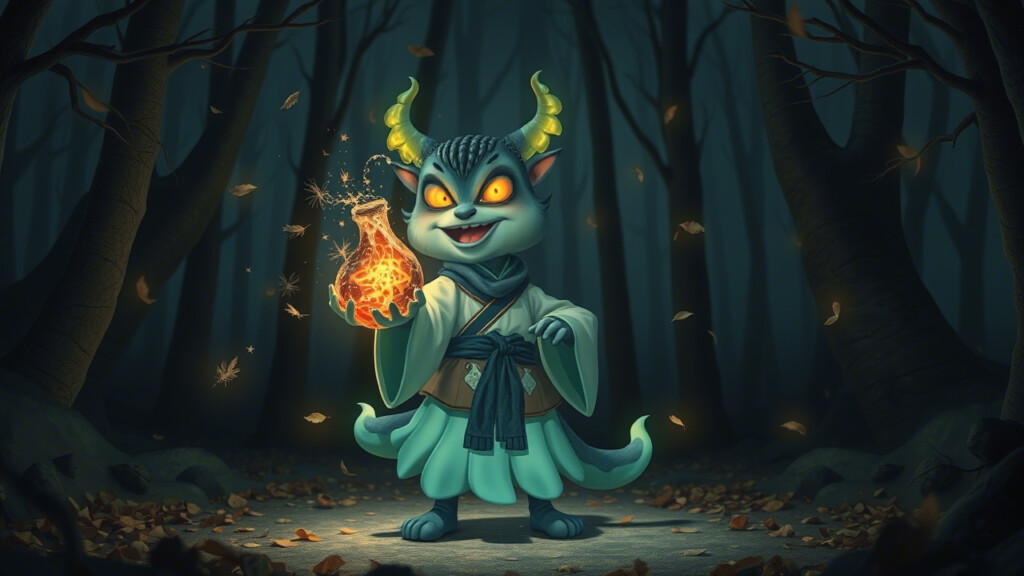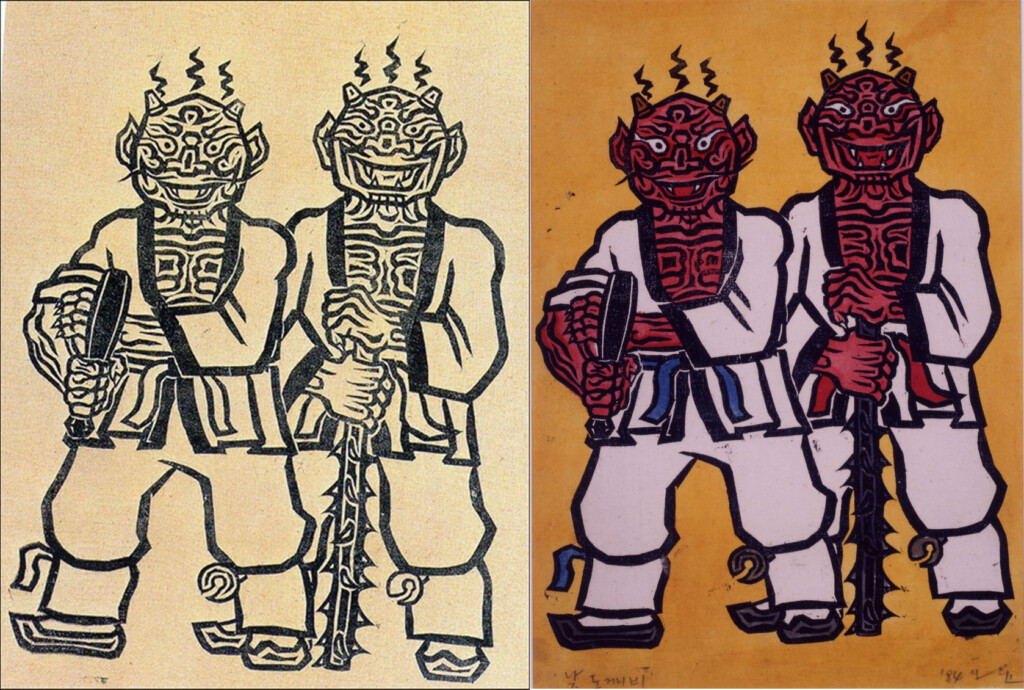A quiet night, the moon casting eerie shadows along a deserted forest path, and then—laughter. Not human, yet not entirely ghostly either. They say it’s a Dokkaebi—a mischievous goblin-like spirit, flickering between worlds, sometimes offering gifts, sometimes playing tricks on the unsuspecting.

Unlike gods or demons, Dokkaebi are neither purely good nor evil. They are like the unpredictable tides of fate—capable of bringing fortune or mischief. Over centuries, their presence has been deeply woven into Korean folklore, from ancient paintings and village gates to modern films and literature.
Dokkaebi – Trickster or Guardian?
Among the many mythical creatures of East Asia, Dokkaebi stand out as one of the most unique. Unlike Japan’s Oni or China’s Huli Jing (fox spirits), Dokkaebi are not born from the spirits of the dead. Instead, they emerge from abandoned objects—an old wooden pestle, a broken bow, or even a long-forgotten stone. According to Korea.net, this belief reflects the Korean folk concept that even inanimate objects can absorb spiritual energy and transform into supernatural beings.
Dokkaebi have no fixed form, but they are often depicted with red skin, pointed horns, and a mischievous grin. They enjoy teasing humans, sometimes rewarding the virtuous with treasures, while punishing the greedy. One popular legend states that anyone who defeats a Dokkaebi in a traditional Ssireum wrestling match will be granted riches. This tale is even documented in research by the Korean Folk Culture Institute, where Dokkaebi are seen as a test of human wit and strength.
Dokkaebi in Korean Culture
Beyond myths, Dokkaebi have deeply influenced various aspects of Korean culture:
- In Folk Art & Architecture: Their images appear on village gates and old house doors, acting as protective talismans against evil spirits. Traditional paintings often depict Dokkaebi wielding a magical club (방망이), capable of summoning gold and silver, symbolizing prosperity and fortune.
- In Traditional Sports: Many folktales describe wrestlers facing off against Dokkaebi in Ssireum (씨름) matches. Even historical texts on traditional Korean sports from Hanyang University mention legends of fighters who encountered these mystical beings in the ring.
- In Modern Pop Culture: The famous 2016 drama “Goblin” (starring Gong Yoo) reimagined Dokkaebi as a tragic, otherworldly figure. After its release, online searches for Dokkaebi increased by over 300% (VisitKorea, 2017), demonstrating the lasting fascination with this folklore.

From ancient murals to K-dramas, Dokkaebi have become a symbol of Korea’s unique cultural identity—playful yet powerful, mysterious yet charismatic.
The Mysterious Legends of Dokkaebi
One of the most intriguing Dokkaebi stories is tied to the Dokkaebi Road in Jeju Island.
On this peculiar stretch of road, cars appear to roll uphill even when turned off, and water seems to flow against gravity. Locals once believed that this was the work of Dokkaebi playing tricks on humans, using their magic to distort reality. However, scientists have since debunked the myth, explaining that it’s an optical illusion caused by the surrounding landscape, making a downward slope appear as an incline. Despite this revelation, the road remains a popular tourist attraction, drawing thousands of curious visitors every year (VisitKorea, 2023).
Dokkaebi in the Modern World
Dokkaebi have transitioned from myth to mainstream culture, appearing in various industries:
- Gaming & Animation: Dokkaebi appear in famous video games like “MapleStory” and “DokeV” by Pearl Abyss. According to Pearl Abyss’s 2022 report, “DokeV” gained significant attention, amassing over 10 million trailer views in just one week.
- Movies & Webtoons: Beyond “Goblin,” Dokkaebi feature in many Korean webtoons and horror films, including “The Wailing” (2016), a movie inspired by folklore about spirits and supernatural tricksters.
- Brand Mascots: Various Korean companies use Dokkaebi as a symbol of agility and intelligence, such as the logo of the Kia Tigers baseball team and Dokkaebi Foods.
Regardless of where they appear, Dokkaebi remain true to their nature—mysterious, mischievous, and always ready to challenge humans.
Is a Dokkaebi Watching You?
Perhaps one night, you’ll hear an unexpected chuckle echo in the darkness. Or maybe something in your house will vanish—only to reappear in the most bizarre place. Don’t be alarmed—it might just be a Dokkaebi playing tricks on you!
Can you outwit a Dokkaebi and earn its reward, like in the old legends? Or will you fall victim to its pranks? The answer… is something only the Dokkaebi knows.
